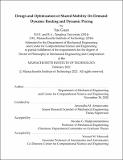Design and optimization of shared mobility on demand : dynamic routing and dynamic pricing
Author(s)
Guan, Yue,Ph. D.Massachusetts Institute of Technology.
Download1252628610-MIT.pdf (7.673Mb)
Other Contributors
Massachusetts Institute of Technology. Department of Mechanical Engineering.
Advisor
Anuradha M. Annaswamy.
Terms of use
Metadata
Show full item recordAbstract
Mobility of people and goods has been critical to urban life ever since cities emerged thousands of years ago. With the ushering in Cyber-Physical Systems enabled by the development of smart mobile devices, telecommunication technologies, as well as affordable, accessible and powerful computing resources, new paradigms are revolutionizing urban mobility. Among these, Shared Mobility on Demand Service (SMoDS) has changed the landscape of urban transportation, providing alternatives with a customized combination of affordability, flexibility, and carbon footprint. Dynamic routing and dynamic pricing are two central pillars of an SMoDS solution, where the former offers customized routes according to the specific passenger request and real time traffic conditions, and the latter provides incentive signals that appropriately influence the passengers' subscription of the service. Although emerging SMoDS solutions have seen remarkable successes, further improvements are in need. In this thesis, we present an integrated SMoDS design with dynamic routing and dynamic pricing that introduces two major improvements over the state of the art: (i) enhanced optimality in travel times through dynamic routing with added spatial flexibility, and (ii) explicit accommodation of behavioral modelling of empowered passengers so as to lead to an accurate dynamic pricing strategy. The first part of this thesis focuses on the development of the dynamic routing framework with a new concept of space window. To accommodate the complexity introduced by space window in the optimization of dynamic routes, we propose an algorithm based upon the Alternating Minimization (AltMin) paradigm, and demonstrate an order of magnitude improvement in computational efficiency compared to benchmarks provided by standard solvers. The second part of this thesis, related to dynamic pricing, is broken down into two modules, with the first related to behavioral modelling of empowered passengers based on Cumulative Prospect Theory (CPT). The CPT based behavioral model is able to capture the subjective and potentially irrational behaviors of passengers when deciding upon the SMoDS ride offer amidst uncertainties and risks associated with framing effects, loss aversion, diminishing sensitivity, and probability distortion. Key properties and the implications of the CPT based passenger behavioral model on dynamic pricing are discussed in detail. The second module of dynamic pricing determines the desired probability of acceptance from each passenger so as to optimize key performance indicators of the SMoDS such as the estimated waiting time. A Reinforcement Learning (RL) based approach combined with the problem formulation in the form of a Markov Decision Process (MDP) is used to estimate this desired probability of acceptance. The proposed RL algorithm deploys an integrated planning and learning architecture where the planning phase is carried out by a lookahead tree search, and the learning phase is achieved via value iteration using a neural network as the value function approximator. Two major challenges that arise in this context is the varying dimension of the underlying state and the arrival of information in a sequential manner where long-term dependency needs to be preserved. These are addressed through the incorporation of Long Short-Term Memory (LSTM), convolutional and fully-connected layers. Their judicious incorporation in the underlying neural network architecture allows the extraction of this information and successful estimation of the desired probability of acceptance that leads to the optimization of the SMoDS. A number of computational experiments are carried out using various datasets of large-scale problems and are shown to result in a superior capability of the proposed RL algorithm.
Description
Thesis: Ph. D., Massachusetts Institute of Technology, Department of Mechanical Engineering, February, 2021 Cataloged from the official PDF of thesis. Includes bibliographical references (pages 181-192).
Date issued
2021Department
Massachusetts Institute of Technology. Department of Mechanical EngineeringPublisher
Massachusetts Institute of Technology
Keywords
Mechanical Engineering.